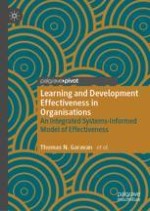2020 | OriginalPaper | Buchkapitel
2. Definitions and the Evolution of Learning and Development Research and Practice
verfasst von : Thomas N. Garavan, Fergal O’Brien, James Duggan, Claire Gubbins, Yanqing Lai, Ronan Carbery, Sinead Heneghan, Ronnie Lannon, Maura Sheehan, Kirsteen Grant
Erschienen in: Learning and Development Effectiveness in Organisations
Aktivieren Sie unsere intelligente Suche, um passende Fachinhalte oder Patente zu finden.
Wählen Sie Textabschnitte aus um mit Künstlicher Intelligenz passenden Patente zu finden. powered by
Markieren Sie Textabschnitte, um KI-gestützt weitere passende Inhalte zu finden. powered by
